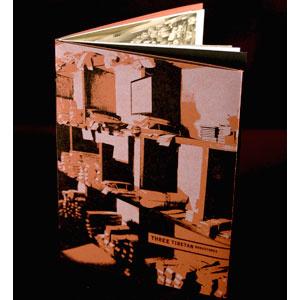
Three Tibetan Bookstores
By Clifton Meador
Chicago, Illinois: Clifton Meador, 2007. Edition of 50.
6.125 x 8.125"; 12 pages. One fold-out page extends image 2 to 22". Letterpress, offset, and laser printing. "Partially Enumerating Tibetan Buddhism" pamphlet (3 x 5.25"; 32 pages) housed in library card envelope on inner back flap. Printed at the Center for Editions, Purchase College and at the Center for Book & Paper, Columbia College Chicago.
Meador combines five components: photographs of thee bookstores in China, a photograph of a monk purchasing a book, and a pamphlet "Enumerating Tibetan Buddhism.”
Clifton Meador: "’Enumerating Tibetan Buddhism' is a compilation of topic entries from three English-Tibetan dictionaries I bought in China. One was actually printed in India and has some very funny English. I went through these books, and extracted entries that used numbers as a mnemonic device to teach various aspects of Tibetan metaphysics. I was struck by the way numbers are so important in their Buddhism. In the Christian tradition I was raised in, three was about as large a number as we talked about frequently. They have thousands of Buddhas.…
“The font in this book is the same font in Kora. This time it encodes a story about how frustrating it was to try to buy books when I couldn't read the language at all. (If a reader were patient and willing to take the trouble, it would be possible to decode the cipher using an English frequency of occurrence table to figure out which drawings stand for which letters.) I thought there was some abstract conceptual connection in this idea (an unreadable story about not being able to read books) that might be interesting/funny. I think that at least people will get the idea that there is some kind of text on those pages that is unreadable.
“The little book in the back is supposed to give some idea about what might be in those unreadable books. The form, that of a library card, suggests that the ownership of the books (part of the function of a library card is to assert control and ownership of a book) would be full of frustration: the little book is full of mnemonic codes for abstract spiritual ideas, and offers no access to those ideas and practices. The reader is faced with knowing something that isn't particularly informative or helpful. It is part of my daily experience, being overwhelmed with tons of useless information, but information that gives me the illusion of knowledge.
“The entire piece reflects on book ownership, at least my own relationship with books. I have a degree of book lust for books that is sometimes out of control: many times I would rather have a book than an actual experience. I see some problems with that, but I still really love books.
“Even books I can't read!”
$85 (Last Copy)